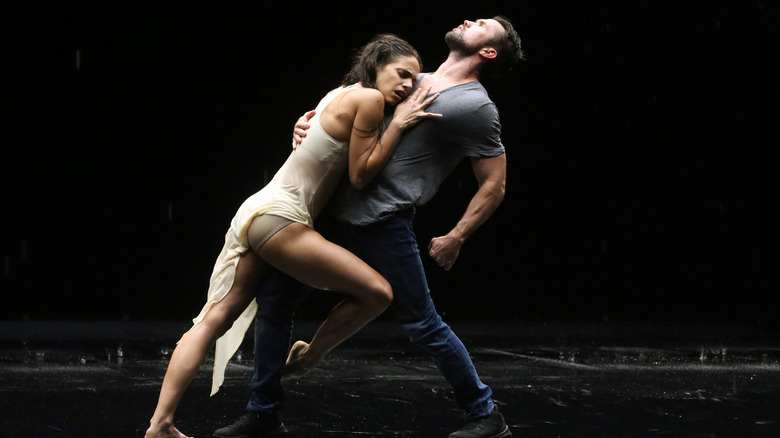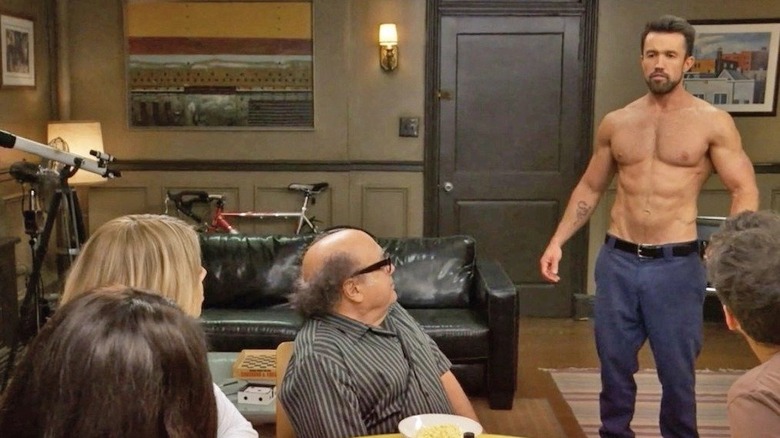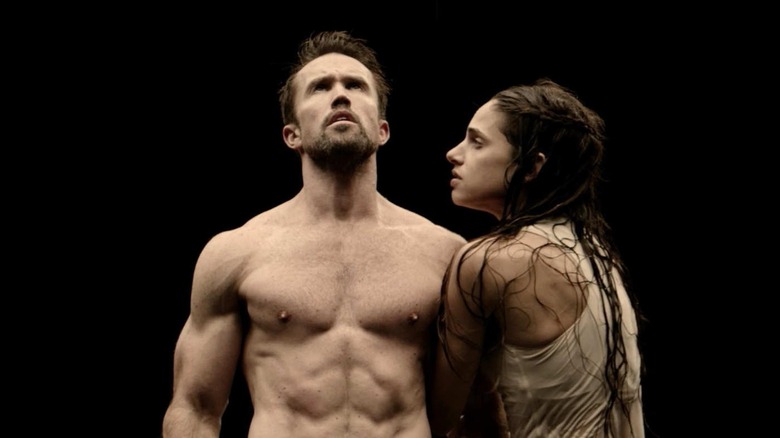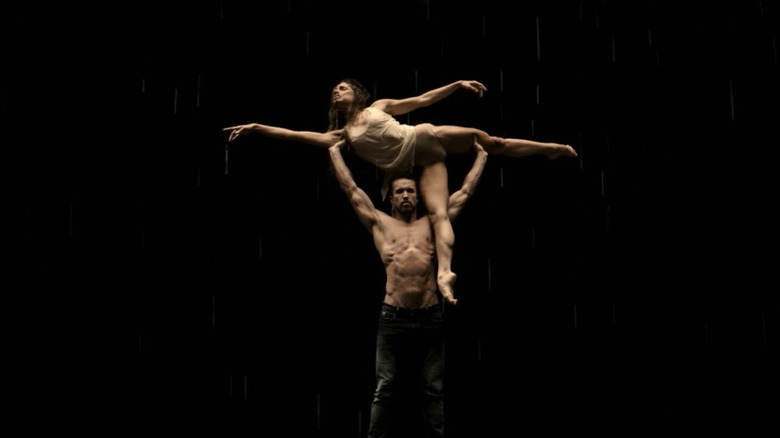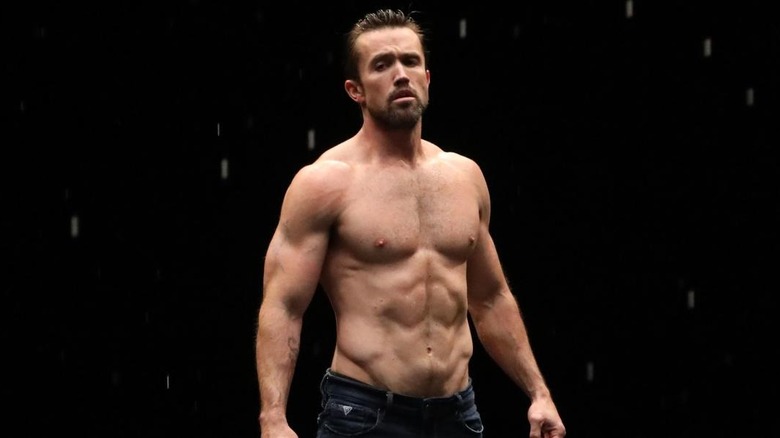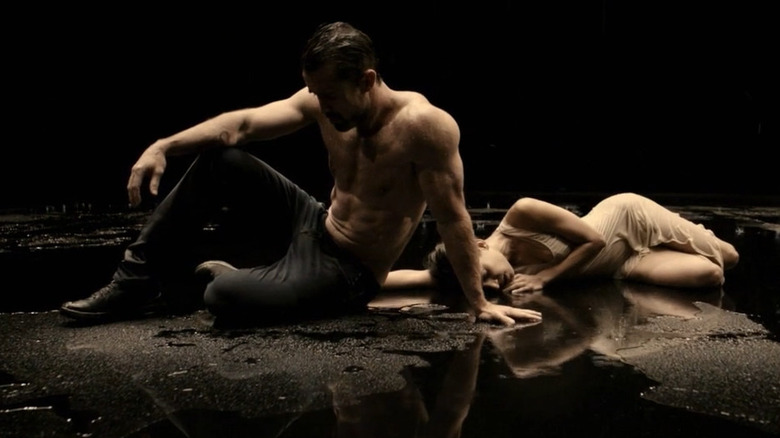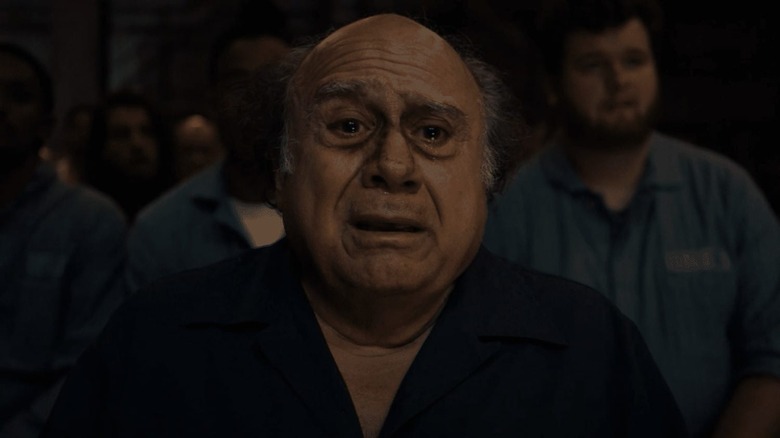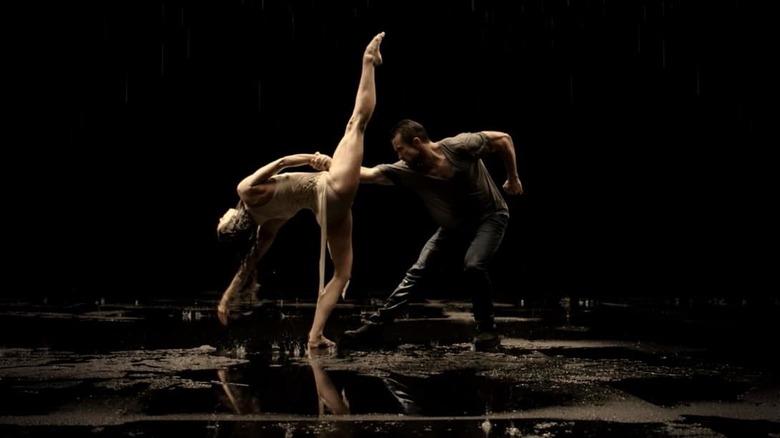Mac's Coming Out Dance In It's Always Sunny In Philadelphia Took Some Serious Training
We expect the gang from "It's Always Sunny in Philadelphia" to do outrageous things, but the last thing we expect is for them to do something incredibly heartfelt and sincere. And yet, in the incredible season 13 finale, that's exactly what happens. Struggling to find a way to come out to his father, Mac performs an elaborate dance routine that symbolizes his inner turmoil. A lesser comedian might have gone with the obvious punchline, making the dance go horribly wrong and look poorly executed. Instead, this eternally boundary-pushing show managed to subvert audience expectations yet again and deliver a breathtaking number. So how did Rob McElhenney, an actor and series co-creator with zero dance experience, manage to pull off such an impressive feat?
Now, this dance number wasn't the first time McElhenney went to physical extremes on "Sunny," transforming his body in a major way for the sake of a bit. The actor put on 60 pounds between seasons 6 and 7, then lost them again in time for season 8. But at the start of season 13, McElhenney thought it would be funny if his character got incredibly buff. Mac's transformation goes unexplained at first, but the true reason behind his newfound muscles is eventually revealed — through dance.
McElhenney trained for months before rehearsals began
Before McElhenney could even rehearse his "Sunny" dance number, he had to prep his body for this physical feat. The series co-creator opened up about how he achieved this dramatic transformation in an interview with Men's Health.
"I'm gonna break it down for you, because it's actually quite simple, and anybody can do this [...] First thing's first: if you have [a] job — like a 9-5 job — quit that. Do you like food? Forget about that. Because you're never going to enjoy anything you eat. Alcohol? Sorry. That's out. [...] You're good friends with the trainer from 'Magic Mike?' Arin Babaian. So you want to give Arin a call. And you want to make sure he's at your house and takes you to the gym at least twice a day, because you're gonna want to do your muscle-building in the morning and then your cardio in the afternoon. Now, do you have a family? Like a significant other or kids? Yeah, forget about them. You're not going to have time to deal with them. So that's really all you have to do. And make sure you have a studio pay for the entire thing, because it could become exceptionally expensive. So, I think if you just do all those things, then you too can have an absolutely unrealistic body type, such as me."
This routine was also speckled by chicken breast meals from a personal chef and multiple visits to the physician per week to monitor testosterone levels. Of course, McElhenney is being sarcastic here — this type of physical transformation is impossible to accomplish without an insane amount of dedication and resources. But why would he bother getting so ripped in the first place? As it turns out, it wasn't just for the sake of looking like a superhero.
Dancing was fun but not funny for McElhenney
After months of preparation, the actor was finally able to begin rehearsing with choreographer duo Alison Faulk and Leo Moctezuma. Faulk had worked with the "Sunny" cast previously on the "Magic Mike" episode from season 12, "PTSDee." McElhenney insisted he had "zero ability to dance" before he started rehearsing with Faulk, as he relayed to Vulture. Despite his hesitations, the choreographer saw promise in him. After a while, the actor wasn't just able to dance — he actually enjoyed it. It's a good thing, too, because those rehearsals spanned two-and-a-half months, multiple times a week for hours on end.
"They were so patient. It got to the point where I was looking forward to working with them at the end of each day," McElhenney continued. "It didn't feel like work or exercise that I didn't want to do."
Even though McElhenney did a lot of training to pull off this dance number, he still didn't want to be the only one on stage. Professional dancers have years of training, whereas he had only had a few months. He knew that if he wanted to execute the dance well, rather than let the joke lie in his inability to perform, he would need a more experienced partner.
"If I did it by myself and if I couldn't pull it off, then it would just come across as funny," the "Sunny" co-creator clarified. "If we got a trained dancer — in our case, incredible dancer and ballerina Kylie Shea — then hopefully everybody's watching her. My purpose in the dance is to exalt her and make her look as good as possible."
But why didn't McElhenney want the dance to "just come across as funny?" Why was it worth it to go through all this extra trouble when the more obvious comedic option would have been a low-budget, poorly executed attempt akin to "The Nightman Cometh?"
Why go through all this trouble to execute a dance?
Even though Mac's sexuality wasn't predetermined, his character had homosexual undertones (at times crescendoing into overtones) during the course of the first eleven seasons of "Sunny." But it wasn't until Mac came out in season 12 that the series creators realized how much this issue resonated with their viewers. The reaction from fans was ultimately what encouraged McElhenney to pursue a truly tender and sincere moment of self-exploration for his character.
"We got a really overwhelming emotional response from the LGBTQ community last year [when Mac came out]," McElhenney revealed. "I took it seriously and I felt it would be completely unexpected to have this much more emotionally resonant end to the season. You would expect that Mac would express himself through the art of contemporary dance and it go horribly wrong, until you realize that's not the direction we're taking."
If the show was taking this dance seriously as a means for Mac to express himself, that meant McElhenney had to take it seriously too, hence the intense preparation and training. He and his choreographers considered doing a comedically self-serious hip-hop routine — a genre that Faulk specializes in — but inevitably took a different route.
"Rob came out of the writers' room saying he wanted it to represent the struggle, the push and pull, and that helped Leo [Moctezuma] and me to put the choreography together in a way that showed vulnerability and strength," Faulk added. "The woman represents the light and the good and everything pure and amazing — and he's the dark. So it's basically a giant metaphor for being able to love and accept yourself."
Was the dance a success, or a slap in the face?
Dancing with a partner also worked in tandem with Mac's confused metaphor about gayness and his struggle with his father. "There's like this storm inside of me and it's been raging my whole life," Mac muses, "and I'm down on my knees, and I'm looking for answers, and then God comes down to me and it's a very hot chick and she pulls me up and we start dancing."
The explanation is "intensely confusing," McElhenney admits, but that's part of the humor — and the beauty — in the dance. "We realized if he couldn't really verbalize what it is that's happening to him, it doesn't matter because he's just hoping for someone — whether it's God, his mom, or his dad, or his surrogate father Frank — to say that it's all right to feel what I feel and be who I am," he explained.
So, were McElhenney's efforts worth it? The dance ultimately does translate as a tender moment, but the subversion of expectation for comedy — and particularly in such an irreverent series — is what makes it incredibly funny in its own right. To do something so elaborate, so daring, and so completely impossible to anticipate is awe-striking, emotional, and hilarious all at once. Not only do we see Mac come to a true moment of self-realization for the very first time, but we also see a tender exchange between himself and Frank, two characters that, by Frank's own admission, have never truly connected before that moment.
The dance might work on the level of spectacle and story, but the question remains: Did McElhenney rise to the technical challenge of a professionally choreographed dance, or would real dancers raise their eyebrows at this actor's attempt at their craft?
Were the real dancers impressed by McElhenney's performance?
McElhenney's dance partner, Shea, had years of professional experience, but even she was impressed by how quickly McElhenney picked up her trade. "We tried one of the lifts, just to see how we moved and how we vibed together," Shea recalled. "I think everyone had the same reaction. We couldn't believe he wasn't a dancer. He wowed me from the very first day with his abilities as a dancer."
The ballerina wasn't the only one with a dance background that was blown away by McElhenney's abilities. "Rob is naturally a caretaker, and that's something you have to be as a partner," added Moctezuma. "We can't let our partner fall. It's not about us as the male dancer; our goal is to make our partner look beautiful. He would get it on the first try with Alison [Faulk] and we would be like, What the hell?"
All of their practice culminated in one crazy moment. At the very end of the dance, Shea takes a running leap into McElhenney's arms. Most people might have been scared to trust a relatively untrained dancer with such a complicated move, but Shea described this moment as "exhilarating."
"You have to establish this blind trust, and you have to know your partner is there and will do everything in their power to protect you because you could get injured and your career would be over," she told Vulture. "But the thing is, Rob instinctually has all of the qualities of an incredible dance partner. He's the type that would throw himself on the floor just so you wouldn't get hurt."
This difficult leap might not have felt like a challenge to Shea, but the strenuous twelve-hour shoot was a struggle even for her. "It was one of the most physically demanding days of dance I've experienced and I've done a lot of dance," she admitted.
DeVito was blown away by McElhenney's dedication
This dance also marked a major turning point for Mac, who, over the course of "Sunny," had never had a true emotional breakthrough. "His goal was to figure out how to make people laugh and cry and really be touched," explained the finale's director, Todd Biermann. "You've always seen Mac brush off his father's lack of interest in him and this is the first time you really saw that land with any kind of emotional impact."
One member of the gang who has had his fair share of breakdowns is Frank, portrayed by Danny DeVito. Frank has "unzipped" several times, including in the season 9 episode "The Gang Gets Analyzed," where he recalls a traumatic childhood experience. All of Frank's moments of self-reflection have been overtly comedic, but Mac's lack of self-awareness made this sincere attempt at introspection all the more compelling.
"It's just remarkable how little command Mac has of his intelligence," DeVito remarked. "He's the most conflicted person I've ever met in my life. I thought it was a brave thing for Rob to do this, to tackle this story in this way. I was very proud that he tackled the insides of Mac and I was very moved by the dance. Thank God for the woman [Shea], because she was brilliant! I could watch it all day long. I thought it was really, really sweet, man."
The "Twins" star was impressed with McElhenney's commitment as a dancer and athlete as well as a writer and actor. "Rob doesn't fool around," DeVito added. "He was very dedicated to it and I was impressed with his technical prowess. He looked good doing it. I'll tell you one thing, I don't think I could ever do it. Leave it to Alvin Ailey."
Will Mac ever dance again?
McElhenney has always been the unbridled workhorse of the "Sunny" gang, but his dedication to this dance number still managed to surprise his collaborators of many years, including Biermann.
"Rob marches to his own drummer," the director said. "He's always trying to challenge himself in ways I don't think most people would. He's not a terribly athletic person, but he got in insane shape for that. I can't say I'm surprised by it, but I was certainly amused and entertained and very impressed."
Sadly, "Sunny" fans who want to see more of McElhenney's dance skills put to the test should not hold their breath. When asked if we can expect to see another number from Mac in the future, the actor gave an incredibly Mac-like answer.
"I still can't dance!" he insisted. "I can do just that one routine. If I went to a club and I started dancing, I would probably try to do that routine that I've done at least a thousand times. I can only express myself through the art of contemporary dance very specifically to that song and that number."
That one number to that one song took months of training and countless hours of rehearsals for McElhenney, but it was all worth it in the end. Season 13 had an unforgettable finale, and Mac finally bore the inner contents of his soul. As Frank says in the final line of the episode, "I get it."
